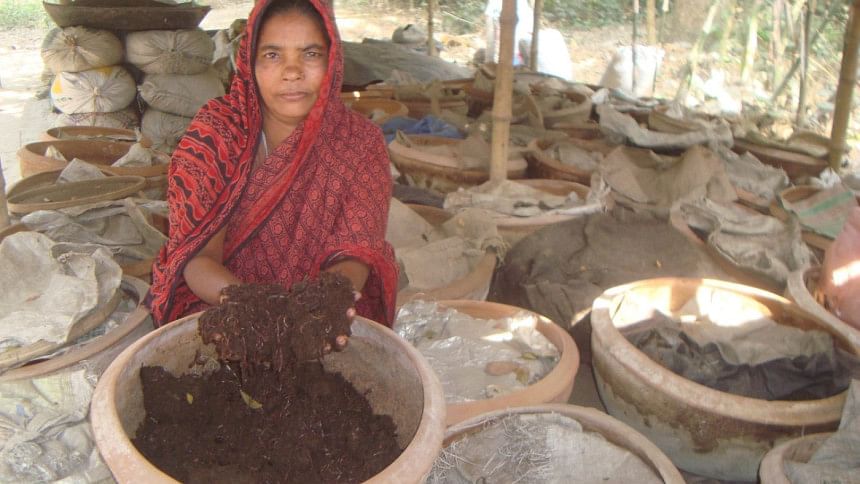Vermiculture brings self-reliance to 2,000 Jhenidah women

Thanks to the pioneering efforts of Rebeka Khatun and Sukhjan Begum, from Dapna village in Jhenidah's Kaliganj upazila, around 2,000 local women and girls are becoming self-reliant by producing earthworm rich vermicompost fertiliser. Rebeka and Sukhjan initially participated in training on the subject provided by Japan-based non-government organisation Hunger Free World, before motivating other village women to take up the activity as well.
“Vermicompost has ended my poverty,” says Rebeka. “I used to sell gold ornaments door-to-door. Then one day a housewife assumed I was a beggar asking for alms. It made me so ashamed I decided to find something else. When I met SM Shahin, in-charge of the Hunger Free World project, I found what I was looking for.”
“I once collected paddy from rat holes to feed my family,” recalls Sukhjan, “My husband was reluctant to work. I helped other people embroider nakshi kantha bedcovers for a small income. I sold puffed rice door-to-door. That was before I discovered the potential of vermicompost.”
The women started to produce their own vermicompost in 2005. “Nowadays I have 100 pots producing fertiliser in 16 village households,” says Rebeka. “I sell 20 maunds of fertiliser per month for Tk 8,000, with another Tk 10,000 per month earned from selling worms. We now have a brick home. We installed a tube well, built a sanitary latrine and a cowshed for my three cows, as well as a biogas plant. From vermiculture income I have also purchased 14 decimals and taken one bigha of land on lease.”
“All 97 of the households in the village now produce vermicompost,” says Sukhjan. “I maintain 200 pots in five households. My monthly income is around Tk 15,000, which has enabled me to increase my assets and improve my family's living standard.”
Neighbour Sonabhan Khatun meanwhile anticipates a monthly income of around Tk 12,000 from her vermicompost business. Vermiculture has made her solvent, she says.
“Most of Dapna's women are involved with vermicompost production,” notes an official at the upazila agriculture office. “Worms are sold at Tk 1500 per kilogram, while the fertiliser fetches Tk 10 per kilogram. Many of the women are now leading solvent lives.”
The women of the village have also formed a savings association with income from vermiculture, where they each deposit a portion of monthly earnings. The combined savings currently amount to Tk 3 lakhs, which is used to fund loans for members and to contribute to the education costs of village students from the poorest families.
Farmers have proved supportive. “Their organic fertiliser is more effective than chemical ones. It doesn't harm our soil, which then retains fertility for much longer,” says farmer Altaf Hossain of nearby Neamotpur village. Environmentally-friendly vermicompost is currently the fertiliser of choice for around 60% of farmers in the area.
“The women with vermiculture experience also provide training for others,” notes Hunger Free World's SM Shahin. “An organic farming training centre has been established at Agmundia village in Raigram union for the purpose.”
In recognition of Dapna's burgeoning vermiculture industry, on 4 January 2017 Khulna's deputy commissioner visited the village to observe their success.

 For all latest news, follow The Daily Star's Google News channel.
For all latest news, follow The Daily Star's Google News channel. 



Comments